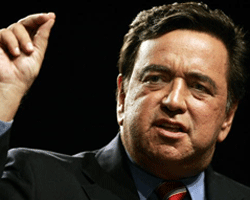
DAVENPORT, Iowa – New Mexico Governor Bill Richardson spoke to a standing-room-only crowd of more than 200 Iowans at Grinnell College on Monday, his appearance illustrating both how high the standards are for Democrats in this election, and why, despite his strong performances on the stump, he will continue to struggle to gather support.
“I want to talk to you about the issues. . .five issues,” Richardson began. The first was the war and, within seconds, he got to the crux of his position on Iraq. “Get all the troops out,” he said. “Get ’em all out.” He explained that he differentiates himself from the frontrunners by supporting zero residual troops and by having the background in diplomacy to keep post-withdrawal Iraq from metastasizing.
Richardson went on to outline his position on education, where he emphasized the flaws of the current student loan system, the need to pay teachers more, and the failure of No Child Left Behind, which he would scrap. The third issue on Richardson’s agenda was health care, where the candidate has followed the zeitgeist of the Democratic field and proposed a plan for universal coverage. Next up was energy and Richardson’s plan to reduce greenhouse gases and transition the nation to renewable forms of energy. Here, as he often does on the campaign trail, Richardson highlighted his background as energy secretary, pointing out that his credentials make him uniquely qualified to meet the challenges of America’s energy future. Last, Richardson addressed civil liberties, promising to outlaw warrantless eavesdropping and shut down Guantanamo on his first day in office.
On the whole, Richardson was articulate and passionate, presenting an orthodox but strong progressive message. Richardson also has an impressive resume working in his favor, which, in addition to his stint as a cabinet secretary and his current post as governor of a western state, includes over a decade in Congress, a period as the U.S. ambassador to the United Nations, and a key role in negotiations with Saddam Hussein, North Korea, and between rival factions in Sudan.
And yet all of that doesn’t seem to be enough. While Richardson’s event at Grinnell was packed, his second appearance that day, in Marshalltown, had a number of empty seats. Nationally, Richardson is polling at just 2.5 percent, according to Pollster.com. And his fundraising totals are just a fraction of Clinton’s and Obama’s. Meanwhile, his closest competitor, John Edwards, has banked nearly twice as much.
So why can’t Richardson catch fire? It’s likely a combination of factors. First of all, Richardson articulates a platform, not a vision. After his event at Grinnell, an attendee named Norm told me that Richardson “had a good solid opinion on every question he was asked. There wasn’t anything I disagreed with.” A positive response, but not exactly the upswell of fervor a campaign wants to evoke in someone who has listened to its candidate for over an hour. John Edwards is touring Iowa railing against a system corrupted by the powerful, the rich, and their lobbyists. Barack Obama is decrying partisanship and preaching hope. Beneath their over-arching messages, they hold progressive positions on the issues that closely mirror Richardson’s. But they package them within a narrative that makes the case for their candidacy.
Richardson’s recitation of the party platform, with an added emphasis on his executive competency, isn’t going to cut it. In this race, a conventional Democrat simply isn’t good enough. Perhaps Richardson could have competed strongly in 2004, where John Kerry events were certainly no more inspiring than Richardson’s are today. But in this election, the Democrats have a powerful lineup. There’s the former First Lady who has been on the national scene for fifteen years and who has forged her persona in the fires of a million fierce political fights. There’s the former senator and VP candidate who has campaigned more or less non-stop for four years, honing his populist image. Then there’s the junior senator, a man who transcends identity politics and seems to have a personal charisma that can move mountains (and raise money by the millions). Each of them presents more to voters than the standard Democratic talking points. What was once good enough, no longer is.
But Richardson’s campaign is not giving up hope. At the Marshalltown event, I cornered Richardson’s national press secretary, Tom Reynolds, asking him about the governor’s future in the race. “We don’t have to win in Iowa to do well,” Reynolds told me. “Iowa is about expectations. A top three finish is all we need.” In Reynolds’ scenario, the momentum from that surprising performance would be transferred to New Hampshire, where fiscally-minded independents who respect Richardson’s record of balancing budgets and cutting taxes propel him to a positive finish.
Then comes the big coup, February 5. “New Mexico, Colorado, Utah, Texas—all western states,” Reynolds said. “All states that face issues that Governor Richardson deals with everyday—water, land uses, they simply have a different way of thinking in the western states. We think we’re perfectly positioned to do well in those kind of places.”
Perhaps, but Richardson’s lack of resources will surely hurt him. Thus far, Richardson has shown some evidence that as people get to know him he gains their support. In Iowa, for instance, he was polling at basically zero in late 2006, but after months of tenacious campaigning he is now near nine percent, according to Pollster.com. Meanwhile, Senators Joe Biden and Chris Dodd haven’t seen a similar rise. But Richardson can’t do retail politics in New Mexico, Colorado, Utah, and Texas. He’ll need organization, infrastructure, and advertisements—not to mention the money to pay for them all.













